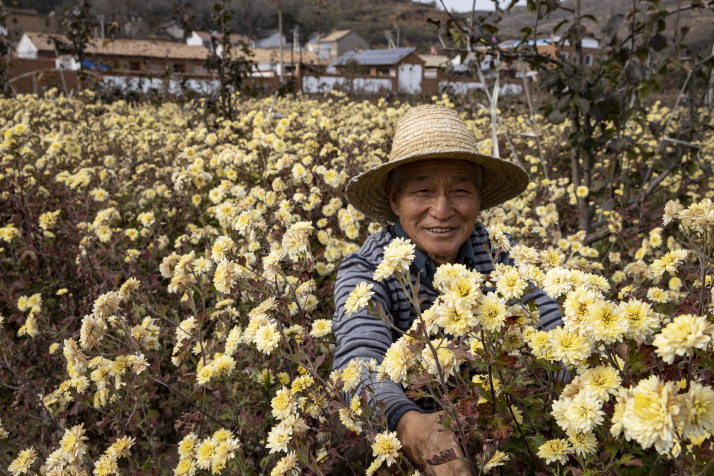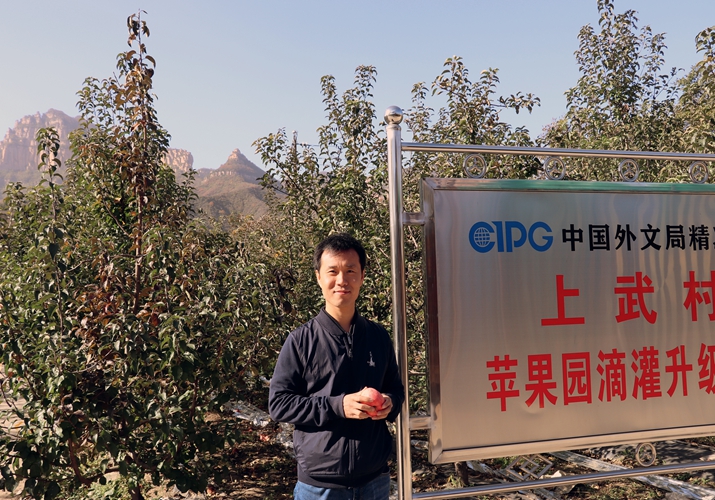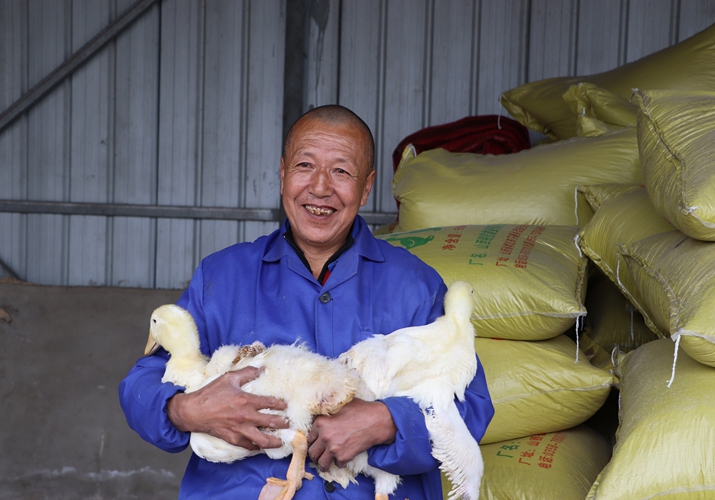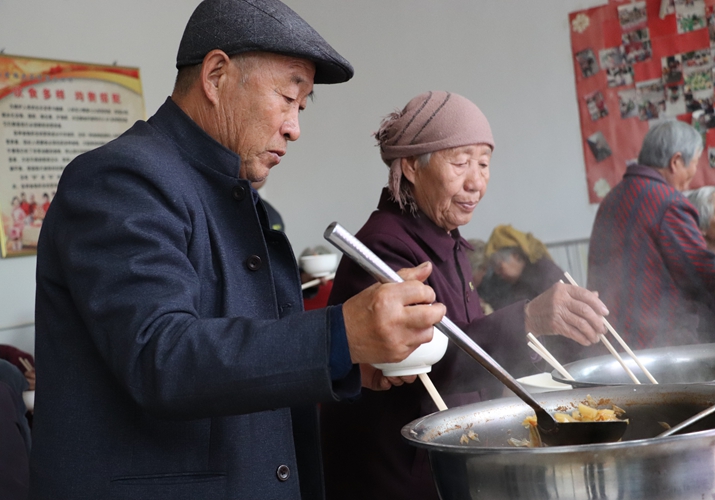A villager picks chrysanthemum for medical use in Zuoquan County on October 21(CHEN JIAN)
Wang Peng remains busy in his last month serving as a temporary official in Lichang, a village in Zuoquan County, Shanxi Province in north China. Apart from his routine of collecting and checking data about the village's poverty alleviation work, he is coordinating several programs aimed at increasing income for the villagers.
Wang was sent to the village in 2018 by China International Publishing Group (CIPG) based in Beijing. Since 2002, CIPG has sent its employees to the impoverished county for hands-on participation in the poverty alleviation drive of the country. Wang was part of a three-person team of colleagues assigned to different areas of the county, with Lichang Village being the focus of their mission. Their term of service was two years, but was extended by another six months to the end of 2020, the deadline for all the poor counties in China like Zuoquan to be lifted out of poverty.
The good news is that this target has been reached ahead of the deadline. On November 23, the government of Guizhou Province in southwest China approved nine of its counties to be removed from the list of poverty-stricken counties. These are the last of China's 832 poverty-stricken counties to be lifted out of poverty by this year.
Wang Peng at an apple orchard funded by CIPG on October 21(HU FAN)
The list of poverty-stricken counties was finalized in 2012. One in every three counties in China was included and only nine provincial-level areas were free of poor counties. These impoverished counties account for half of China's territory and are home to over 80 million people.
In the past seven years, 10 million people were lifted out of poverty in China on average every year. The population living in absolute poverty dropped from 98.99 million at the end of 2012 to 5.51 million by late 2019. Over the same period, the number of impoverished counties decreased from 832 to 52.
This November, authorities in the last provinces and autonomous regions with poverty-stricken counties successively declared their localities free of absolute poverty following extensive inspections. They include Xinjiang Uygur Autonomous Region, Ningxia Hui Autonomous Region, Guangxi Zhuang Autonomous Region, Yunnan Province, Sichuan Province and Gansu Province. Guizhou was the final provincial-level area to declare victory over absolute poverty.
Liu Yanzhong at the Lichang village duck farm where he works(HU FAN)
Consolidating gains
Shanxi Province was among the first provinces to be declared poverty free. Its poverty reduction work was examined and approved in April 2019, but efforts continued across the province with projects being initiated or upgraded.
In the village of Lichang, the 181 registered poor people were lifted out of poverty last year, but despite this, Wang and his team didn't rest on their laurels. Their latest project involves planting two hectares of apricots.
"The policy is that even though the village is poverty free, our support will continue," Wang told ChinAfrica.
Although the village has shaken off poverty according to national standards since 2019, the team understands that there is risk for the villagers, especially those just above the poverty line, to fall back into poverty. With CIPG's more than 15 years of previous experience assisting the county, the team enhances industrial projects for the village to ensure sustainability.
With funding from CIPG, the team cooperated with professional companies and built a duck farm, a solar power station, and recently an apricot orchard for the village. Villagers benefit from these projects by holding a share in the operation, or working as an employee doing daily maintenance. More specific operations, such as marketing, are performed by professionals.
For example, the duck farm, which was first built in 2018 and expanded this year, provides jobs for 10 villagers, each of whom can make around 50,000 yuan ($7,623) per year. Some 30 shareholders each can get 3,000 yuan ($457) per year.
Liu Yanzhong is one of the villagers working for the farm. Aged 62, he couldn't find a proper job in cities as a migrant worker as many younger villagers do and had to depend on the meager income from farming in the past. "Working in the farm has provided me proper income without having to leave my home village," he told ChinAfrica.
The remainder of the income from these projects goes to the village public account and is used for public welfare programs. One such program is a care center, where three meals are provided for free each day for villagers over the age of 65.
To ensure that the programs will keep running, the team realized it was important to change the mindsets of the people they are helping. One principle they apply is that whatever program they start, villagers who participate have to make their own contribution to it.
In the case of the Lichang village duck farm, villagers were invited to be the shareholders of the farm and the shares were not given for free. Low-interest loans were provided to those who wanted to take part but didn't have the money.
"If these shares were given for free, they might take the help for granted and may not work hard to be independent," said Wang.
It took dedicated effort to convince the villagers who were not willing to make investments into programs like this. But as early participants began benefiting from these programs, more and more villagers came on board and now this model of engagement and investing in programs has become an established source of income for them.
Apart from the CIPG team, there are over 80 other task forces for poverty alleviation covering some 160 poor villages across Zuoquan County. These teams are made up of employees from government departments at the provincial or county level, as well as those from public organizations and companies who volunteered to dedicate two or more years to the cause of poverty alleviation like Wang.
Thanks to their concerted efforts and other dedicated officials, the county is showing notable results in multiple indicators. By July, all of its poor population was lifted out of poverty, a much better result according to the national standard, which requires poverty occurrence of no higher than 2 percent of the population. For around 2,800 people in the county who are at higher risk of returning to poverty, one-to-one assistance is provided to control the risk.
The elderly have lunch at the Lichang village care center(HU FAN)
Sustainable approach
Rich in coal and mineral resources, the county used to depend on the mining industry for its economic development. As environmental conservation has become a national focus, the local government is shifting to a more sustainable approach in its efforts to lift people out of poverty.
Since 2017, tourism has been developed as a key industry for green development, given the county's abundance of sightseeing attractions.
One major project involves building a road network that connects the county's almost 280 tourist sites. Along the key segments of the roads, an afforestation project is under way to plant golden-leafed trees, creating a scenic belt known as the Golden Valley.
To enhance attraction to tourists, efforts are being made in villages connected by the road network to tap in to their tourism potential. Agriculture is being redirected for this purpose. Fruit and vegetable gardens have been designed to provide tourists with both sightseeing and fruit-picking experiences.
In one village, a modern training center was built to attract people from other parts of the county to attend training sessions, while in another village, a contemporary attraction has been created by painting the walls of the village with images from popular cartoons and movies.
A solar power station of Lichang Village(CHEN JIAN)
One highlight of the county's efforts to attract tourists is Zuoquan Folk, a folk song contest. Thanks to a singing tradition that dates back to ancient times, the county has developed a unique school of singing with a repertoire of around 20,000 folk songs. The folk song contest was started in 2019 to leverage that cultural attribute and boost tourism. Folk singers from across the world are invited to take part.
To host the event, a theater has been built as its permanent venue. Delicately designed and located among high rocks in a park accessed by the road network, the theater has already become a landmark that attracts tourists.
The building of these projects itself has brought benefits to villagers. By working on the construction of infrastructure or collecting rent from their land leased to these projects, they receive an extra income, while their living conditions are improved.
In the long run, however, it is the tourists attracted to the villages that the government wishes to help reshape the local economy. Government funding is provided to beautify the streets and renovate households into family restaurants. Already, about 1,500 people across the county have made an average additional income of around 2,300 yuan ($330) a year from operating homestays and other sites for rural life experiences.
The environment has also become a key consideration for Wang's team when they plan for poverty alleviation programs. They controlled the size of their cattle breeding program, though it is a profitable business, because cattle may damage the indigenous vegetation in the mountains. They now prefer planting programs and have planted apple, cherry and apricot trees in different villages. At the Lichang village duck farm, they are planning a program to process duck droppings as manure to make the breeding program recyclable.
Zuoquan County's model of development is recognized at the nation level. This September, it was approved by the Ministry of Agriculture and Rural Affairs as the national pilot county to transform its focus from poverty alleviation to rural revitalization, a national initiative to build strong, beautiful and wealthy villages across the country by 2050. This has marked a new stage for the once poverty-stricken county.
(Print Edition Title: Giving Poverty the Boot)
Comments to hufan@chinafrica.cn




